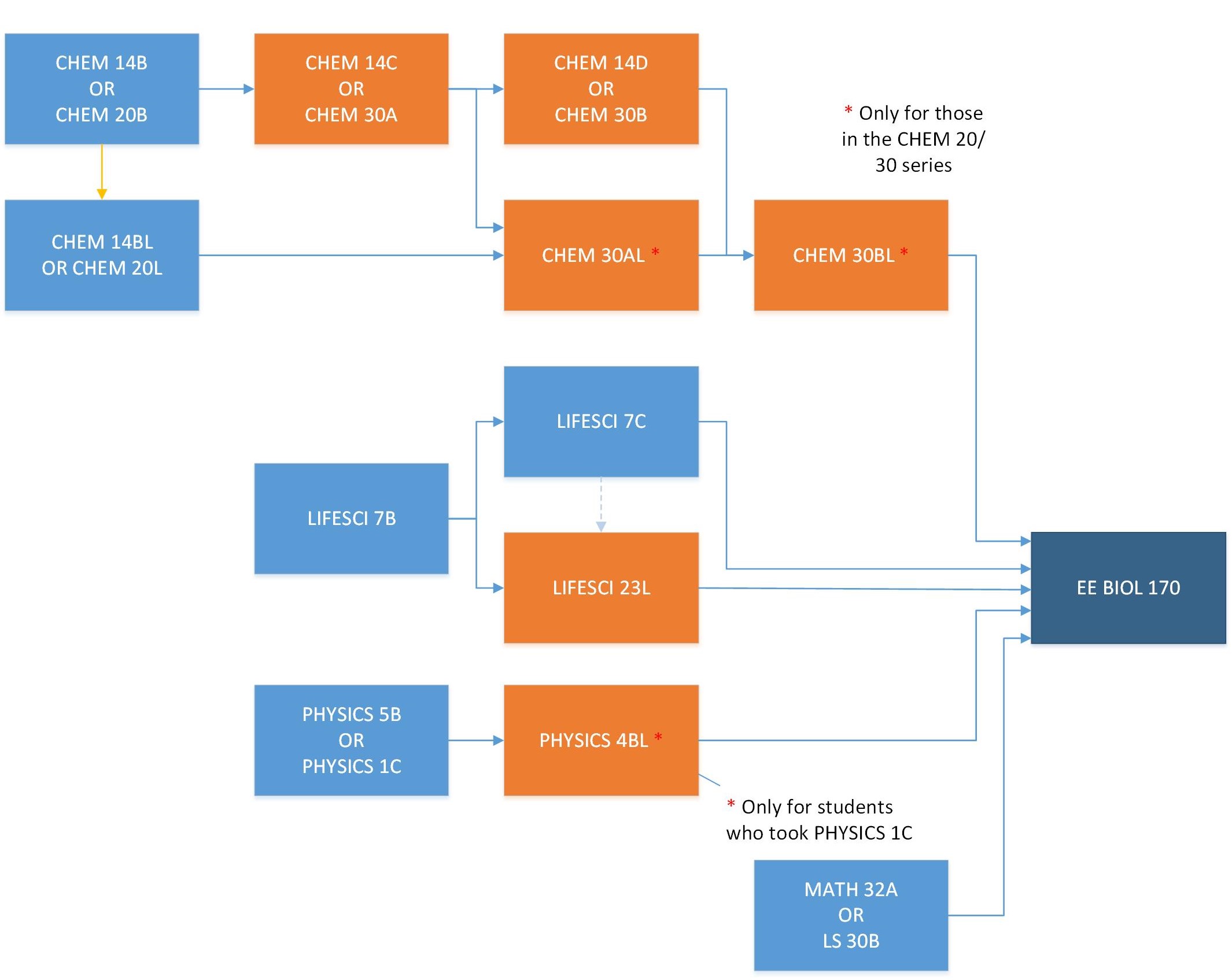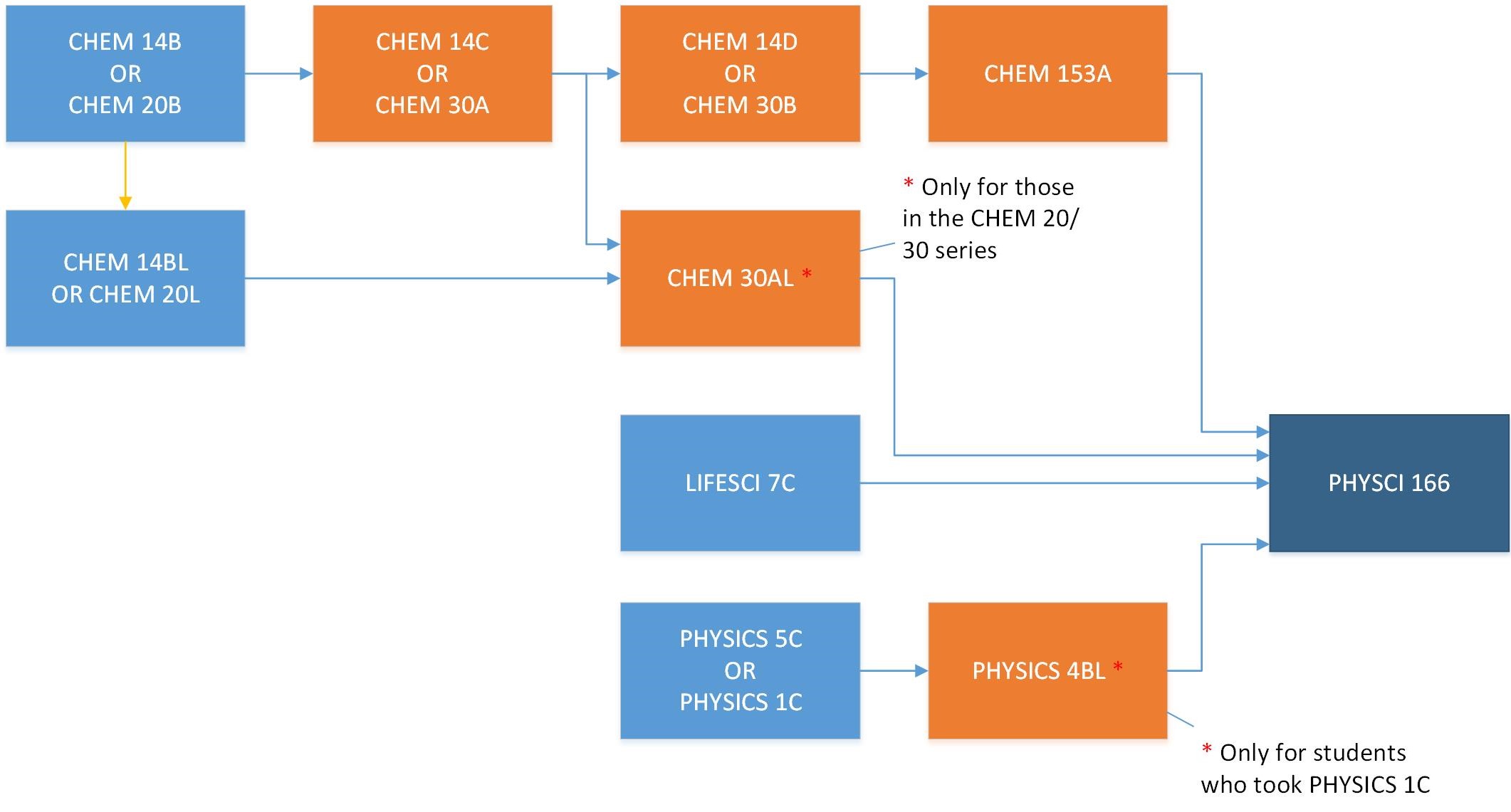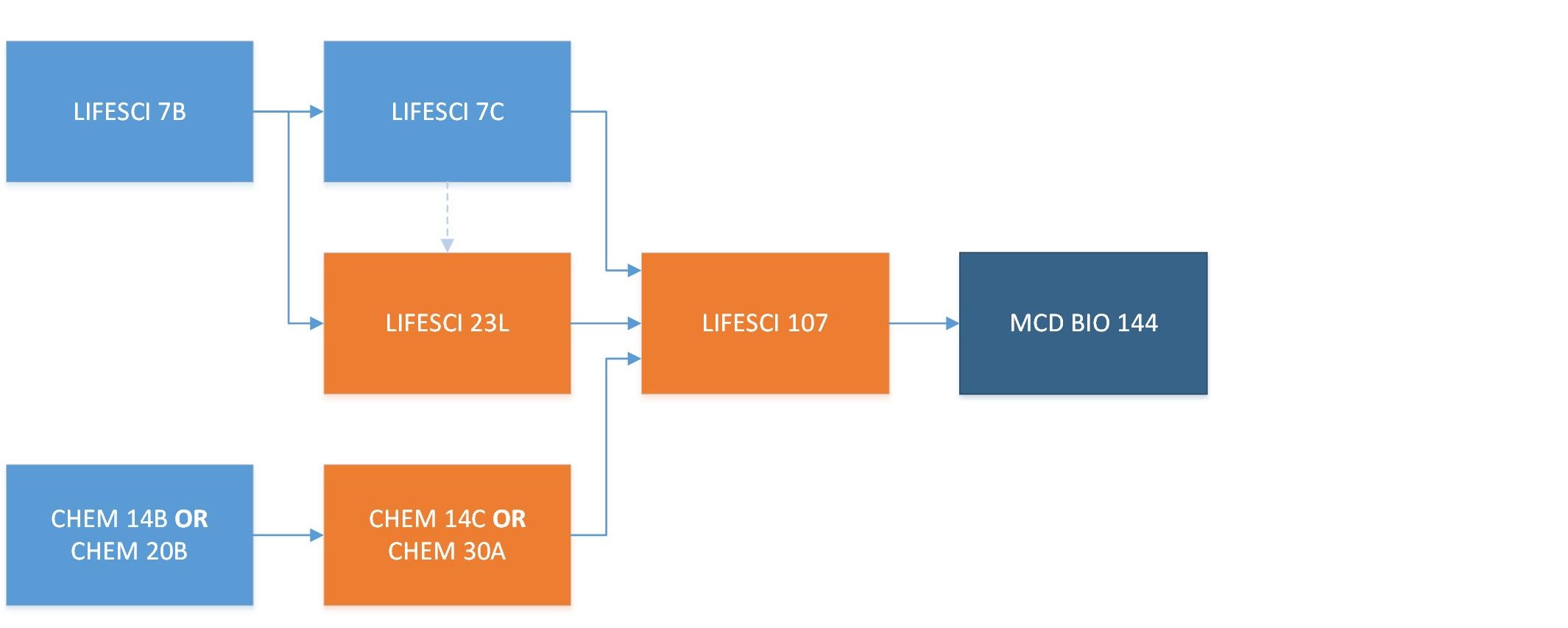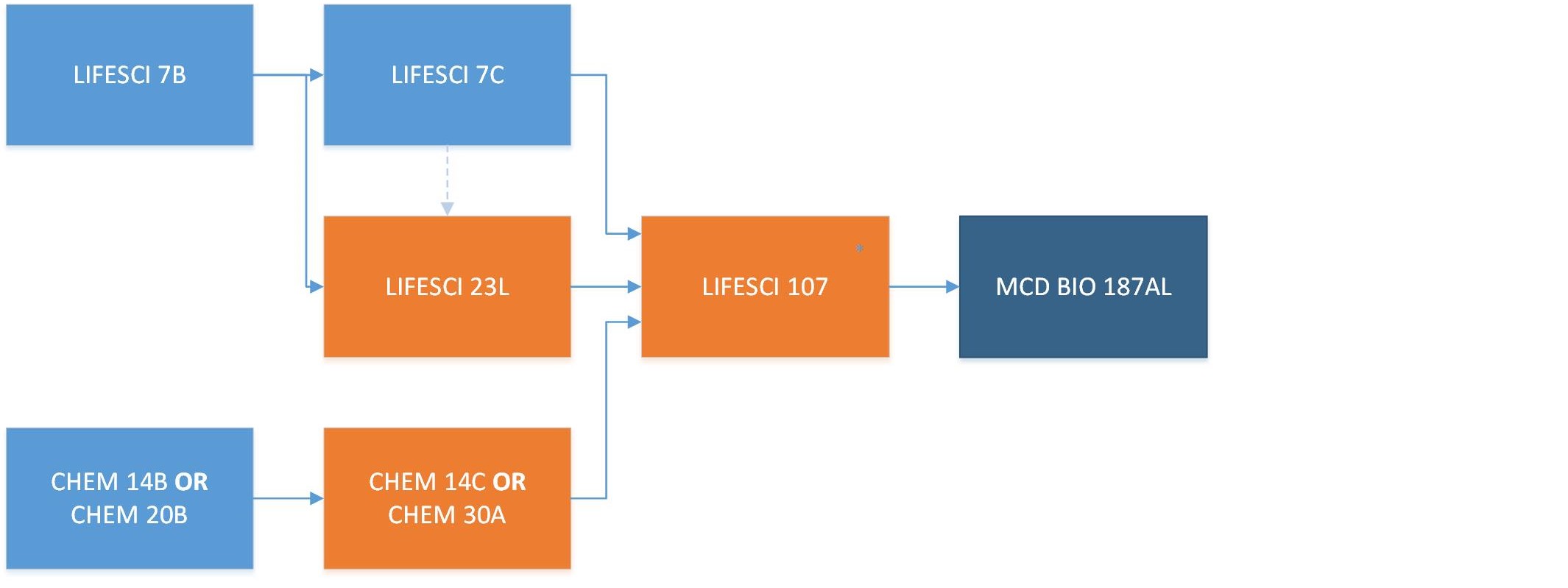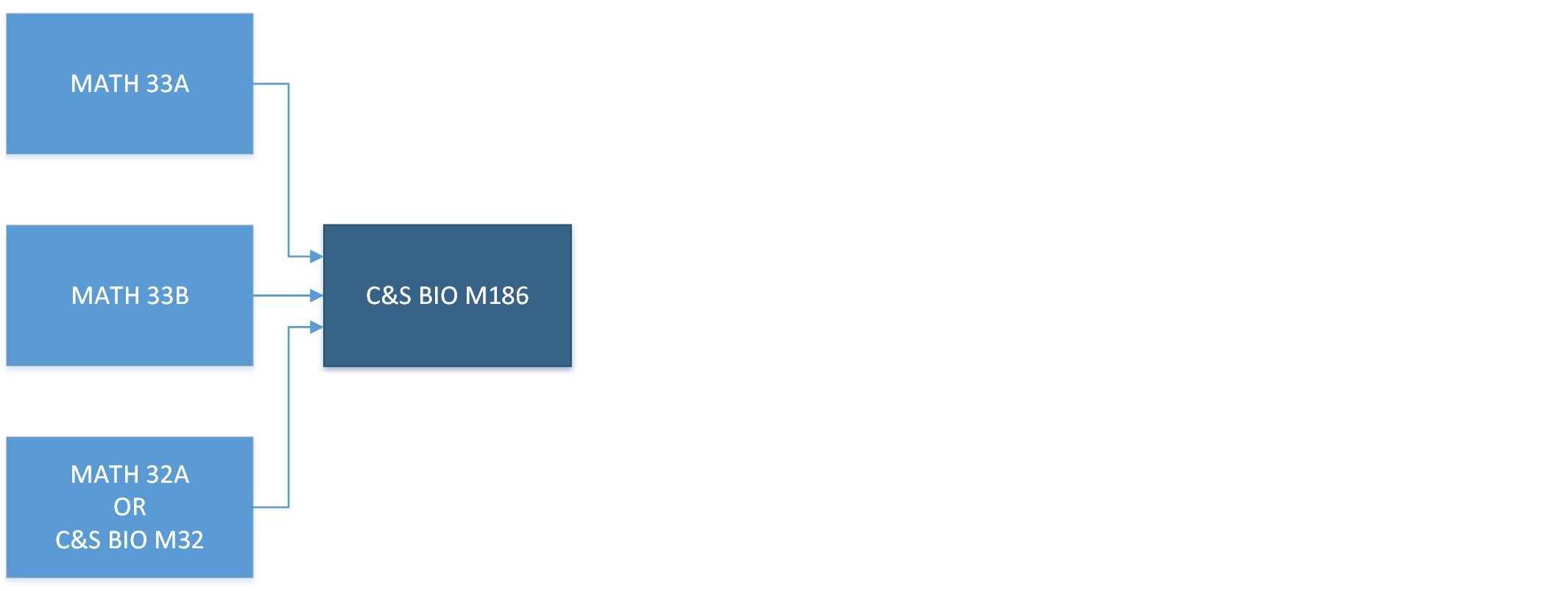The Systems Biology concentration is designed for students who want to understand biological systems holistically and quantitatively and who want to pursue research with emphasis on systems and integrative principles in biology. The curriculum in this concentration imparts an understanding of systems biology (often called the new physiology) using dynamical systems, control, computer simulation, and other computational methods–integrated with biology.
Concentration Curriculum
1. EE BIOL 170: Animal Environmental Physiology (6) OR PHYSCI 166: Animal Physiology (6)
2. MCD BIO 100: Introduction to Cell Biology (5) OR MCD BIO 144: Molecular Biology of Cellular Processes (5) OR MCD BIO 165A: Biology of Cells (5)
3. PHYSCI 125: Molecular Systems Biology (5) OR MCD BIO 187AL Research Immersion Laboratory in Genomic Biology (5)
4. C&S BIO M186/BIOENGR CM186/COM SCI CM186/EE BIOL M178: Computational Systems Biology: Modeling and Simulation of Biological Systems (5)
5. Elective course chosen from list below:
| INFORMATION AND CONTROL IN BIOSYSTEMS |
|
| BIOENGR 180 | System Integration in Biology, Engineering, and Medicine I (4) |
| BIOENGR 180L | System Integration in Biology, Engineering, and Medicine I Laboratory (4) |
| BIOMATH 206 | Introduction to Mathematical Oncology (4) |
| NEURO 205 | Systems Neuroscience (5) |
| PHYSCI 107 | Systems Anatomy (5) |
| PHYSCI C144/C244 | Neural Control of Physiological Systems (4) |
| PHYSCI M145/NEUROSC M145 | Neural Mechanisms Controlling Movement (5) |
| PHYSCI 173 | Anatomy and Physiology of Sense Organs (4) |
| MOLECULAR AND CELLULAR BIOSYSTEMS | |
| BIOENGR 110 | Biotransport and Bioreaction Processes (4) |
| CHEM 153A/153AH | Biochemistry: Introduction to Structure, Enzymes, and Metabolism (4) |
| BIOENGR C101/BIOENGR C201 | Engineering Principles for Drug Delivery (4) |
| MCD BIO CM156/MCD BIO CM256/MIMG CM156/MIMG CM256 | Human Genetics and Genomics (5) |
| MCD BIO 165A | Biology of Cells (5) |
| MCD BIO M140/BIOL CH M140 | Cancer Cell Biology (5) |
| PSYCH 119A | Neuropsychopharmacology of Emotion and Cognition (4) |
| METHODOLOGY PERTINENT TO BOTH SUBAREAS | |
| CHEM 110A | Physical Chemistry: Chemical Thermodynamics (4) |
| CHEM CM160A/CHEM CM260A/COM SCI CM121/COM SCI CM221/BIOINFO M221/HUM GEN M260A | Introduction to Bioinformatics (4) |
| CHEM CM160B/CHEM CM260B/COM SCI CM122/COM SCI CM222/BIOINFO M222 | Algorithms in Bioinformatics (4) |
| CHEM 156 | Physical Biochemistry (4) |
| CH ENGR CM145/BIOENGR CM145 | Molecular Biotechnology for Engineers (4) |
| MECH&AE 105A | Introduction to Engineering Thermodynamics (4) |
| MATH 134 | Linear and Nonlinear Systems of Differential Equations (4) |
| MATH 136 | Partial Differential Equations (4) |
| MATH 151A | Applied Numerical Methods (4) |
| MATH 151B | Applied Numerical Methods (4) |
| PHYSICS 105A | Analytic Mechanics (4) |
| PHYSICS 112 | Thermodynamics (4) |
| C&S BIO M175/CHEM M186 | Stochastic Processes in Biochemical Systems (4) |
| EE BIOL C119A/C219A | Mathematical and Computational Modeling in Ecology (4) |
| EE BIOL C119B/C219B | Modeling in Ecological Research (4) |
| EE BIOL C135/C235 | Population Genetics (4) |
| COM SCI 168 | Computational Methods for Medical Imaging (4) |
| MCD BIO 138 | Developmental Biology (5) |
Students in the Systems Biology concentration must also complete
- MATH 32A (For students who complete the LIFESCI 30 math series, C&S BIO M32 can fulfill this requirement)
Concentration Course Planning
When planning major coursework, students must be mindful of pre-requisites. Some courses for the Systems Biology concentration have additional pre-requisites that are not part of the CaSB major or pre-major curriculum. The flowcharts below are meant to help students plan out concentration coursework by depicting the requisites for each requirement. These flowcharts were last updated September 2021. Always check the Registrar’s Course Descriptions for updated requisites. Additionally, students must be mindful of when classes are offered (i.e., which quarters). Students should check the Schedule of Classes for updated course offerings.
It is recommended that students meet with their Departmental Counselor regularly to plan out major coursework.
Other Important Information
All major courses must be taken for a letter grade, C or better.
^CaSB made a temporary exception allowing pre-major courses taken between Spring 2020 and Summer 2021 to be taken for a Pass grade. More details on this exception can be found here.
Students must have a minimum 2.0 GPA in upper-division major coursework to graduate.
Students who receive a C- or below in a major course must either repeat the course or petition to have the lower grade count for the major. More information on petitioning can be found here.
Students are subject to any requirement changes in the major, including concentrations, until they are officially admitted to the major.


